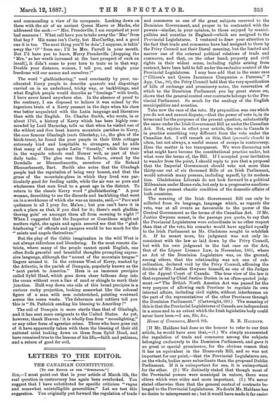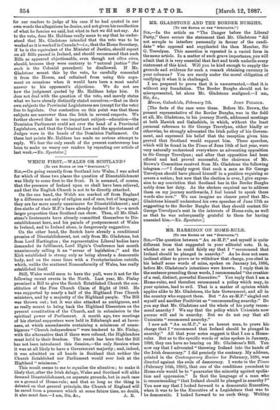LETTERS TO THE EDITOR.
THE CANADIAN CONSTITUTION.
[To lax Emma or no, "erac-rzror....]
Brit,—I must point out that in your article of March 5th, the real question in controversy has again been overlooked. You suggest that I have substituted for specific criticism "vague and somewhat unintelligible generalities." Let me test this suggestion. You originally put forward the regulation of trade and commerce as one of the great subjects reserved to the Dominion Government, and proper to be contrasted with the powers—similar, in your opinion, to those enjoyed by munici- palities and counties in England—which are assigned to the Provincial Legislatures. I ventured to draw your attention to the fact that trade and commerce have had assigned to them by the Privy Council not their literal meaning, but the limited and narrow one of the external political relations of trade and commerce, and that, on the other hand, property and civil rights in their widest sense, including rights arising from contract, have been held to fall under the exclusive control of the Provincial Legislatures. I may here add that in the same case (" Citizen's and Queen Insurance Companies v. Parsons," 7 App. Cas., 96), the Privy Council held that the very specification of bills of exchange and promissory notes, the reservation of which to the Dominion Parliament you lay great stress on, shows that the general control over contracts belongs to the Pro- vincial Parliament. So much for the analogy of the English municipalities and counties.
Take now the case of the veto. My proposition was one which you do not and cannot dispute,—that the power of veto is, in its terms and for the purposes of the present question, substantially the same under the Irish Government Bill as under the Canadian Act. But, rejoins in effect your article, the veto in Canada is in practice something very different from the veto under the Canadian Act. I will remark on this, that ignoratio elencht is often, but not always, a useful means of escape in controversy. Here the matter is too transparent. We were discussing not what might have become the constitutional practice under, but what were the terms of, the Bill. If I accepted your invitation to wander from the point, I should reply to you that a proposal that the Imperial Government should veto not more than thirty-one out of six thousand Bills of an Irish Parliament, would astonish many persons, including myself, by its modera- tion. Gladetonian Liberals do not look forward to a political Millennium under Home-rule, but only to a progressive ameliora- tion of the present chaotic condition of the domestic affairs of both countries.
The meaning of the Irish Government Bill can only be collected from its language, language which, as regards the veto, was at all events as favourable to the power of the Central Government as the terms of the Canadian Act. If Mr. Justice Gwynne meant, in the passage you quote, to say that the Provincial Legislatures were subordinate in no other respect than that of the veto, his remarks would have applied equally to the Irish Parliament as Mr. Gladstone sought to establish it. If he meant more, his judgment was not only in- consistent with the law as laid down by the Privy Council, but with his own judgment in the last case on the Act, that of the Liquor Licence Law, in November, 1885, where an Act of the Dominion Legislature was, on the ground, among others, that the relationship was not one of sub- ordination, declared void by the Privy Council, affirming the decision of Mr. Justice Gwynn° himself, as one of the Judges of the Appeal Court of Canada. The true view of the law is that expressed by Chief Justice Dorian in an often-quoted judg- ment :—" The British North America Act was passed for the very purpose of allowing each Province to regulate its own internal affairs, including civil rights, without interference on the part of the representatives of the other Provinces through the Dominion Parliament." (Cartwright, 389.) The meaning of this is that the Provincial Legislatures of Canada are independent in a sense and to an extent which the Irish legislative body could never have been.—I am, Sir, &c., House of Commons, March 9th. R. B. Heznerrs.
[If Mr. Haldane had done us the honour to refer to our first article, he would have seen that,—(1.) We simply enumerated the regulation of trade and commerce among the subjects belonging exclusively to the Dominion Parliament, and gave it no great or special prominence, for the obvious reason that it has an equivalent in the Home-rule Bill, and eo was not important for our point,—that the Provincial Legislatures are, on the whole, bodies more subordinate than the proposed Dublin Parliament. If it is unimportant for one, it ie unimportant for the other. (2.) We distinctly stated that though most of the Provincial powers were municipal in nature, there were others which were wider and more important. (3.) We never stated otherwise than that the general control of contracts be- longed to the Provincial Legislatures. No doubt Mr. Haldane has no desire to misrepresent us ; but it would have made it far easier for our readers to judge of his case if be had quoted in our own words the allegations he denies, and not given his recollection of what he fancies we said, but what in fact we did not say. As to the veto, does Mr. Haldane really mean to say that he under- stood that Mr. Gladstone intended that the veto was to be worked as it is worked in Canada that the Home Secretary, if he is the equivalent of the Minister of Justice, should report on all Bills passed in Ireland, and should recommend that such Bills as appeared objectionable, even though not ultra vires, should, because they were contrary to "natural justice" (for such is the Colonial precedent) be disallowed. If Mr. Gladstone meant this by the veto, he carefully concealed it from the House, and refrained from using this argu- ment on occasions when it would have been a most useful answer to his opponent's objections. We do not see how the judgment quoted by Mr. Haldane helps him. It does not deal with the question of the veto, and merely states what we have already distinctly stated ourselves,—that on their own subjects the Provincial Legislatures are (except for the veto) free to legislate. Onr contention on this point was that those subjects are narrower than the Irish in several respects. We further showed that in one important subject—education—the Dominion Parliament could act over the head of a Provincial Legislature, and that the Criminal Law and the appointment of Judges were in the hands of the Dominion Parliament. On these last points Mr. Haldane has made no serious attempt to reply. We fear the only result of the present controversy has been to make us weary our readers by repeating our article of last week.—En. Spectator.]



































 Previous page
Previous page